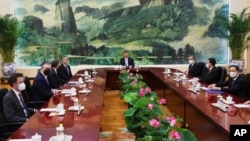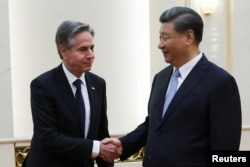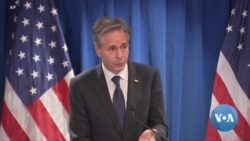U.S. Secretary of State Antony Blinken said Monday the United States and China have an obligation to manage their relationship responsibly, and that he told Chinese leaders during meetings in Beijing that direct engagement is the best way to ensure disagreements do not turn into conflict.
Speaking to reporters in Beijing, Blinken said he had candid and substantive discussions Monday with Chinese President Xi Jinping and top Chinese diplomat Wang Yi.
"I would expect additional visits by senior U.S. officials to China over the coming weeks," Blinken said during a news conference. He added that Washington welcomes further visits by Chinese officials to the United States.
Chinese president Xi Jinping called on the U.S. side to adopt a rational and pragmatic attitude, and work with China in the same direction, according to a statement issued by the Chinese government.
While both sides agreed on the need to stabilize communication, Blinken will not return to Washington with an agreement from the Chinese side to set up military-to-military communication channels.
"At this moment, China has not agreed to move forward with that," Blinken said.
Washington says military communication lines should remain open in the event of a crisis.
Ali Wyne, a senior analyst with Eurasia Group's Global Macro-Geopolitics practice, said in an email to VOA that while it is concerning that China did not accept Blinken's proposal to establish military communication channels, Xi's decision to meet with Blinken "suggests that China, not just the United States, appreciates the importance of slowing the deterioration of U.S.-China ties."
"The trip will not — and was not — expected to change the fundamentally and intensely competitive nature of U.S.-China relations, but it will give the two countries an opportunity to increase the frequency and broaden the scope of high-level dialogues," he said.
Blinken said he raised U.S. concerns about provocative Chinese actions in the Taiwan Strait. He said he reiterated that the United States does not support Taiwan independence and that it continues to expect the peaceful resolution of cross-strait differences.
For decades, the U.S. has been clear that its decision to establish diplomatic relations with China in 1979 rested on the expectation that "the future of Taiwan will be determined by peaceful means," as stipulated in the Taiwan Relations Act.
Moritz Rudolf, a research scholar at Yale Law School's Paul Tsai China Center, told VOA's Mandarin Service in a phone interview that Blinken's comments on Taiwan were "key for the Chinese side" to hear.
He said that while expectations were low for Blinken's visit and there were no major breakthroughs, the talks did not go "as bad as some people might have anticipated."
"I think it went fairly well because … this visit laid the foundation for more visits and more exchanges in the future," he said.
Blinken told reporters he also raised human rights issues, including international concerns about the treatment of people in Xinjiang, Tibet and Hong Kong, as well as the wrongful detention of U.S. citizens in China.
Blinken also said the United States is ready to cooperate with China on issues of mutual interest. He said those include climate change, macroeconomic stability, public health, food security and counter-narcotics efforts.
The United States and China have also agreed to set up "a working group" of joint efforts to address the illicit flow of fentanyl, according to Blinken.
Blinken, who arrived in Beijing Sunday, is the highest-level U.S. official to visit China since 2018. His trip was rescheduled from February after a Chinese surveillance balloon flew through U.S. airspace and was shot down.
Americans wrongfully detained in China
Children of Americans who the U.S. considers wrongfully detained by Chinese authorities had asked Blinken to raise their fathers' cases with his Chinese counterparts.
"Behind every hostage is a family suffering every day," the Bring Our Families Home Campaign said in a tweet on Sunday.
"This Sunday will be the 7th time I've missed Father's Day with my dad," said Harrison Li. "Releasing my dad is one of the easiest things that the Chinese government can do to show they are serious about normalizing relations."
Harrison Li's father, Kai Li, is an American citizen who has been detained in China since September 2016. He was later sentenced to 10 years in prison for espionage, a charge his family rejects.
Alice Lin is the daughter of American pastor David Lin, who was detained under unclear circumstances in 2006 and later sentenced to life in prison on charges of contract fraud. Lin's family staunchly maintains his innocence. Lin's sentence was later reduced, and he is expected to be released in 2029.
"Secretary Blinken, we miss my dad. Please do everything possible to bring him home," Lin told VOA.
Taiwan
Washington has said China's military escalation in the Taiwan Strait was "a global concern."
A senior State Department official told VOA it is an "abiding interest" of the U.S. to maintain peace and stability across the Taiwan Strait. China is seen as ramping up economic coercion targeting Taiwan ahead of its presidential election.
In May, U.S. Director of National Intelligence Avril Haines told senators that a Chinese invasion of Taiwan could halt the world's largest advanced semiconductor production, wiping out up to $1 trillion per year.
"I will say this number is way too small," because it only costs about 6% of China's gross domestic product, said Chen-Yu Li, chief economist of Taishin Financial Holdings in Taiwan.
Li said a military conflict in the Taiwan Strait will affect other Asian economies such as Japan and South Korea, whose GDP totals at least $5 trillion. He also cited the market value of tech giants such as Apple, Nvidia and AMD, which Li estimates is at least $3 trillion.
“If Taiwan is under attack, the stock market in the U.S. may vanish $3 trillion,” Li said during a May 12 event hosted by the Washington-based Center for Strategic and International Studies (CSIS).
"If I am Xi Jinping, I'll be very happy to attack Taiwan. It's just 6%," Li said.
Some information for this story came from Agence France-Presse and Reuters. VOA Pentagon correspondent Carla Babb and Si Yang of VOA's Mandarin Service contributed to this report.








